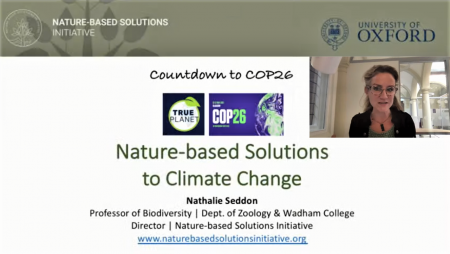Outlining COP26 NbS goals in Oxford COP Conversations Event
During the first edition of the Oxford University ‘COP Conversations‘ Series, NbSI Director Nathalie Seddon discussed the role of Nature-based Solutions (NbS) in addressing climate change and the need for their inclusion in COP26 commitments (see also: “What are ‘Nature-based Solutions’ to climate change?”). Nathalie highlighted that the United National Climate Summit, COP26, taking place […] October 8, 2021
During the first edition of the Oxford University ‘COP Conversations‘ Series, NbSI Director Nathalie Seddon discussed the role of Nature-based Solutions (NbS) in addressing climate change and the need for their inclusion in COP26 commitments (see also: “What are ‘Nature-based Solutions’ to climate change?”).
Nathalie highlighted that the United National Climate Summit, COP26, taking place from 31 October – 12 November in Glasgow, UK, is a major opportunity for systemic change towards a just and sustainable development trajectory, with nature and all the benefits and services it provides, at its heart. However, climate change puts these benefits at risk by exacerbating and increasing ecosystem damage and vulnerability.
She highlighted that also NbS can make an important contribution to cooling later this century (Girardin et al., 2021), but must be implemented in tandem with the rapid decarbonisation of economies. High quality NbS must also be ensured to prevent the misuse of nature-based carbon ‘offsets’ where inappropriate tree planting can be used for ‘greenwash’; providing short-term high risk carbon stores and negative impacts on biodiversity. Misused NbS may also have negative impacts on climate and local communities when not undertaken in collaboration with indigenous stakeholders. To avoid this, adherence to a set of 4 guiding principles for NbS, developed by a consortium of 20 UK-based organisations, helps to ensure the development of high quality, successful and sustainable NbS. The summit holds genuine promise for the nature agenda, but for a successful COP26, several things need to happen:
- COP26 decision text acknowledges the critical role of biodiverse ecosystems in mitigation and adaptation and commits to joint work programmes on climate change and biodiversity loss by UNFCCC and the CBD.
- Enhanced ambition for nature in revised NDCs in addition to, not instead of, increased ambition on emissions reductions: evidence-based targets for improved protection and restoration of a wide range of ecosystems, emphasizing biodiversity and human rights.
- Widespread adoption of clear evidence based standards for demand and supply of carbon sequestration by nature-based solutions to ensure biodiversity and equity benefits (in addition to permanent carbon storage).
- Commitments to defund ecosystem loss and damage and abuses of human rights from commodity supply chains by 2025, include repurposing agricultural subsidies.
- Increased finance for NbS from governments, multilateral development banks, funding mechanisms under the UNFCCC.
The take home message was the need for future climate action to “work with nature, and to be stewards of ecosystems for healthy societies and businesses. It is not the responsibility of conservation professionals, but all our responsibilities. We ignore or undervalue nature at our peril. The evidence from both science and practice has never been clearer.”
Watch a recording of the talk to learn more about the need for NbS within COP26 outcomes.
In the run up to COP26, the COP Conversations series presents academics’ crucial work on a variety of themes, from extreme weather patterns to ecosystems, and from why we need to get to Net Zero, to what countries need to agree to this November. Find further information in the event series programme.
